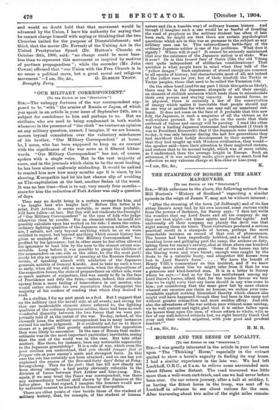THE STAMPEDE OF HORSES AT THE ARMY MANCEUVRES.
[To THE EDITOR OF THE " SPECTATOR:]
SIR,—With reference to the above, the following extract from Hill Burton's "History of Scotland" regarding a similar episode in the reign of James V. may not be without interest :
"After the storming of the town [of Jedburgh] and of its fine abbey Dacre's army had, by his own account, some curious visits from the powers of darkness, for Surrey says : 'I dare not write the wonders that my Lord Dacre and all his company do say they saw that night—six times spirits and fearful sights.' And universally all their company say plainly the devil was that night among them six times. These visitations produced a serious practical result in a stampede of horses, perhaps the most remarkable instance on record of that sort of phenomenon, The horses had been imperfectly hobbled, and a band of them breaking loose and galloping past the camp, the archers on duty, taking them for enemy's cavalry, shot at them above one hundred sheafs of arrows and divers guns. Some of the horses ran into the blazing town and were burnt ; enough were caught by the Scots to be a valuable booty, and altogether 800 horses were lost to Lord Dacre's force.' We have the benefit of Henry VIII.'s commentary on this incident, and if we knew nothing more about him we might infer from it that he was a generous and kind-hearted man. It is in a letter to Surrey where he says And as for the loss misfortuned among my Lord Dacre's horses, albeit that, for the tender favour we bear him we be right sorry that any harm should in any wise come to him; yet considering that the same grew but by mere chance whereof our enemies can claim no honour, we reckon your com- mendable exploit nothing blemished thereby which chance also might well have happened though they had been in the camp not without greater commotion and more sudden affray. And sith also the adventures of the war seldom pass without some mishap, we be well content and right glad that it is rather fallen upon the horses than upon the men, of whose return so whole, with so few of our well-beloved subjects lost, we right heartily thank God your and their valiant acquittal, with your good and prudent conduct."






















































 Previous page
Previous page